Jeffersontown’s first home for neglected children
Writer / Beth Wilder, Director
Jeffersontown Historical Museum
It may be hard to imagine now, but until 1946, children from broken homes, displaced through no fault of their own, had no real place to go. If they were lucky, they were temporarily boarded in private homes. Otherwise, they had to be placed in an institution where they were locked up with juvenile delinquents and often subsequently branded with the stigma of being “incorrigibles.”
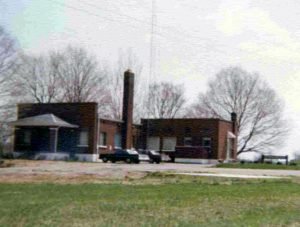 Surprising as it may seem, Jeffersontown became the first place in the nation to try out a new project called “Sunshine Lodge,” which would offer temporary shelter for displaced children. It was the idea of County Welfare Director W.M. Pennycook and County Judge Horace M. Barker.
Surprising as it may seem, Jeffersontown became the first place in the nation to try out a new project called “Sunshine Lodge,” which would offer temporary shelter for displaced children. It was the idea of County Welfare Director W.M. Pennycook and County Judge Horace M. Barker.
According to this new plan, children under the age of 12 would be sent to Sunshine Lodge for several days to several weeks at the most, where they would be “tenderly and sympathetically cared for” until definite arrangements could be made for their keeping. Some might be adopted, while others would be restored to homes that had been corrected with the aid of services like Family Counselling with Experienced Therapists.
Pennycook hoped to make this “a model example of the best methods of meeting the problem of these children.” Wholesome food, clean clothes, medical care and entertainment would be provided through the cooperative contribution of various agencies, including the many fraternal and civic organizations in the county. Children wrenched from home life through the faults of their parents would now be able to spend this period of disruption in a bright, cheery environment where they would be well attended.
The site chosen for this new endeavor was on 15 acres of land in Jeffersontown, where the Jefferson County Poor Farm had been located from 1857-1920. The $35,000 building used to house the children originally stood where the David L. Armstrong Recreation Center is now on Bluebird Lane. The building had not been used for years, but was renovated to house up to 30 children and a small staff. Charlie Vettiner and Ray Baer, county recreation directors, were responsible for creating a playground and providing supervised play for the child guests.
Sunshine Lodge was officially dedicated on Sunday, June 16, 1946. All local clergy were invited to take part in the ceremonies, and the Jeffersontown High School Band provided the music. Judge Barker delivered the principal address, promising the best care for the children who found themselves temporarily homeless, and that the “delinquent will be separated from the dependent, and the latter brought to Sunshine Lodge with its proper environment, conducive to a process of rehabilitation and proper development.”
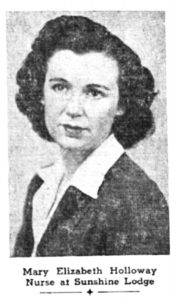
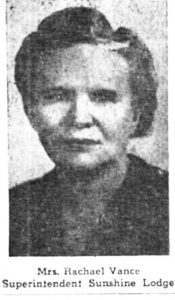
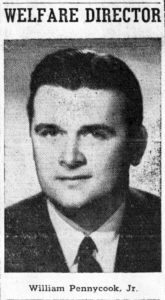 The first group of 22 children, from infants to 10 years old, arrived at Sunshine Lodge in September 1946. The staff was headed by Mrs. Rachel Vance, who was like a mother to the children. She had previously served on the staff of the Kentucky Children’s Home, whose superintendent, H.V. Bastin, had general charge of Sunshine Lodge. Mary Elizabeth Holloway served as Nurse for the facility.
The first group of 22 children, from infants to 10 years old, arrived at Sunshine Lodge in September 1946. The staff was headed by Mrs. Rachel Vance, who was like a mother to the children. She had previously served on the staff of the Kentucky Children’s Home, whose superintendent, H.V. Bastin, had general charge of Sunshine Lodge. Mary Elizabeth Holloway served as Nurse for the facility.
By all accounts, regardless of the sad circumstances that required placing children there, Sunshine Lodge was a happy place. Although a fence surrounded the playground, local children often ran along the fence line,
happily playing with the other children and sometimes asking their parents to adopt certain ones.
Adoption was not actually an issue with the Lodge, however. While the children were there because of family problems, the main goal of Sunshine Lodge was to provide a safe, happy environment for the children, while other county agencies worked to correct the family problems through offering protective services and counseling. According to Mrs. Louise Halbleib, director of the Lodge in the 1960s and 1970s, “These children belong to their families. Regardless of what their mother and dad have done, they belong. And their families come first.” The children were only to remain at Sunshine Lodge until they could either be returned to their parents or placed in foster care “until a parent shapes up and shows promise.”
By 1970, Sunshine Lodge was beginning to get more children than it had room for. While it could adequately handle the 30 children it was originally designed to house, the population of the Lodge could sometimes literally double overnight, depending on circumstances. The bedrooms typically held two bunk beds, and there was really no recreational space indoors. The dining room was the largest area inside the building, and it was of course full of tables and chairs. Volunteers were often frustrated that they were limited in how many could even come to entertain the children, due to lack of space.
Still, civic clubs throughout the county did whatever possible to make the children feel happy and comfortable. They donated clothes, toys, equipment and even threw parties for the children, sometimes chartering buses to take the children to larger facilities for their events.
By 1970, the Lodge was taking care of children from two days old up to 18 years of age, when they would no longer be considered dependents. The children could stay anywhere from a couple of days to several months. During that time, they were temporarily enrolled in local schools. Mrs. Halbleib noted that “these are not problem children but children with a problem. They’re kids just like any other child. They fight, they argue, they get up-tight, they have their good days and their bad ones.”
In 1971, the 25th anniversary of Sunshine Lodge on Bluebird Lane was a somewhat sad occasion – County Judge Todd Hollenbach announced that after the first of the year 1972, the facility would close its doors. By that time, the building needed repairs and was inadequate to house the number of children that could be there at certain times. The new Home of the Innocents at 515 East Chestnut Street in Louisville would be the future home of dependent children “who are found no home or need temporary shelter.”
But Jeffersontown can proudly lay claim to the fact that it was the first place in the nation where neglected children in need of temporary care were given a happy, safe shelter.


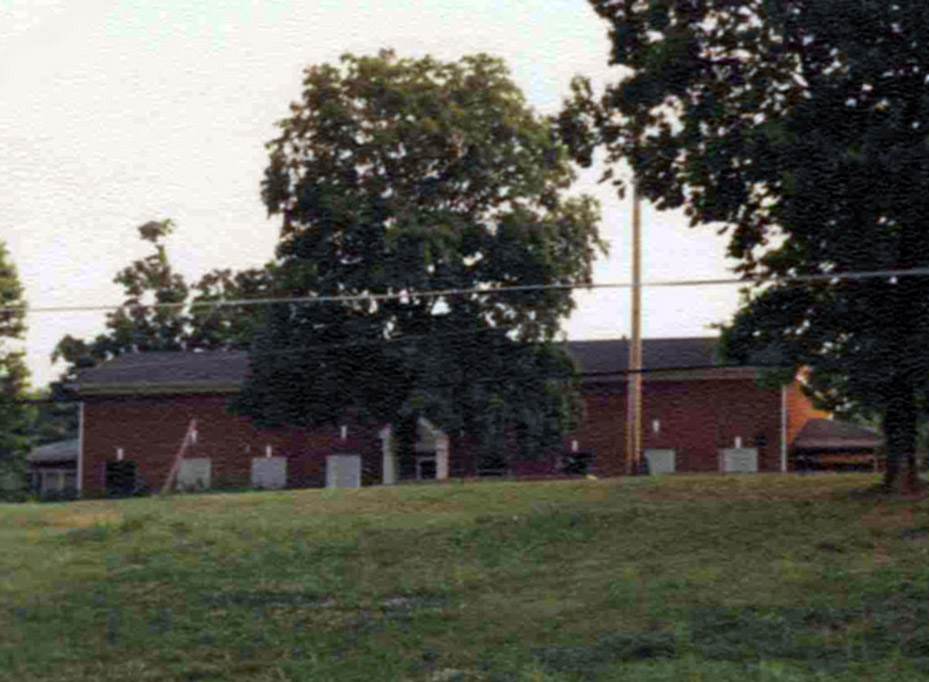




Comments 1
Made me who I am today